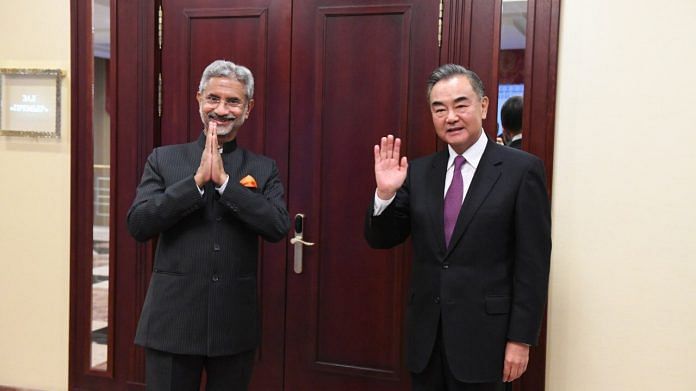New Delhi: External Affairs Minister S. Jaishankar and Chinese Foreign Minister and State Councilor Wang Yi, during their 75-minute phone call Thursday afternoon, agreed that the situation in the eastern Ladakh sector of the Line of Actual Control (LAC) is “not in the interest of either side”.
Both ministers have now also decided to remain in touch with the establishment of a hotline between them.
In a statement issued by the Ministry of External Affairs Friday, India emphasised the September 2020 meeting in Moscow between both the ministers where New Delhi “had expressed its concern on provocative behavior and unilateral attempts of the Chinese side to alter status quo”.
Jaishankar has also informed Wang during the phone call that bilateral relations “have been impacted severely” last year due to the standoff that began in April-May 2020, which also led to the killing of 20 Indian soldiers in the Galwan river valley.
“He noted that the bilateral relations have been impacted severely over last year. EAM said that Boundary Question may take time to resolve but disturbance of peace and tranquility including by violence, will inevitably have a damaging impact on the relationship,” said a readout of the two leaders’ phone conversation released by the ministry.
“Lauding the efforts made by both the sides in successfully achieving the completion of disengagement in Pangong Lake area, both ministers have agreed that both sides should now ‘quickly resolve the remaining issues along the LAC in Eastern Ladakh’.”
The statement added: “EAM said that once disengagement is completed at all friction points, then the two sides could also look at broader de-escalation of troops in the area and work towards restoration of peace and tranquility.”
China, meanwhile, said after the call while the two countries much take the boundary disputes seriously, “it is not the whole of China-India relations”.
Also read: India, China must rebuild trust gradually after ‘great negative impact’ of Ladakh, experts say
‘Resolution of remaining issues’
While both ministers agreed that the progress made so far in the disengagement process is encouraging, they directed both sides to now make efforts to “consolidate the outcomes”.
“It was also necessary to sincerely implement the common understanding reached at various levels. He (Jaishankar) spoke about the need to improve management and control in the border areas,” the readout said.
New Delhi and Beijing also agreed that it is imperative to maintain peace and tranquility in the border areas, which is an “essential basis” for the development of bilateral ties.
“A prolongation of the existing situation was not in the interest of either side. It is, therefore, necessary that the two sides should work towards early resolution of remaining issues,” Jaishankar said during the call.
He added: “It was necessary to disengage at all friction points in order to contemplate de-escalation of forces in this sector. That alone will lead to the restoration of peace and tranquility and provide conditions for progress of our bilateral relationship.”
Chinese Foreign Minister Wang also noted Minister Jaishankar’s recent proposal of ‘three mutuals’ while steering the bilateral relationship forward while taking a “long view” of the ties.
Also read: Coercion, not accommodation — India and China need a new compact for 3,488-km border
‘Boundary disputes not the whole of China-India ties’
According to the Chinese foreign ministry’s readout of the phone call, Wang noted that what had led to the standoff was “clear” and that lessons from the past deserve “deep contemplation”.
“There has been some wavering and back-pedalling in India’s China policy, and practical cooperation between the two countries has been affected. This does not serve the interests of either side. Decades of experiences have shown repeatedly that heightening differences does not help solve problems, and that it only erodes the basis of mutual trust,” the statement said.
During the call, it added, the Chinese foreign minister told Jaishankar that both sides “should handle the boundary question properly to prevent the bilateral relationship from sinking into a negative cycle”.
“While the two countries have boundary disputes is an objective fact, which should be taken seriously, it is not the whole of China-India relations and it should be put at a proper place in the overall bilateral relations,” it said.
Also read: India has reason to be anxious about China stance on J&K — foreign policy analyst Raja Mohan




The reason Chinese marched into Ladakh was to relieve the pressure on the Pakistanis. India had made things very tough for the Pakistanis both on LOC, internally and otherwise. To relieve this pressure, the pakis approached the chinese for help. They decided to put some pressure on the Indians – walked into Ladakh. The Chinese are not known to give anything free. The Quid Pro Quo was for the Indians to start “talking” to the Pakis. Which is exactly what has happened.
Would love to see Shekhar talk about this in his next cut the clutter